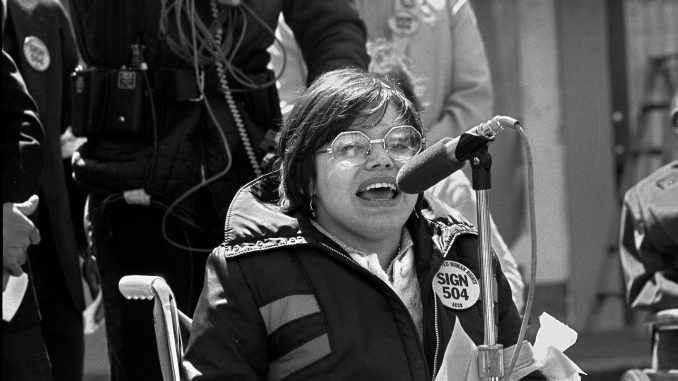
On Wednesday, April 6, SUNY New Paltz had the honor of hosting “In Conversation with Judy Heumann,” a discussion over Zoom. Heumann was one of the first disability activists to push for legislation change nationwide. She was a pioneer in creating the Americans with Disabilities Act and the Individuals With Disabilities Education Act.
At 18 months old she got polio and used a wheelchair for most of her life because of the disease. Heumann was recently in the 2020 documentary “Crip Camp” about a summer camp for kids with disabilities. She has also co-wrote her recent memoir “Being Heumann.”
The conversation was led by April Coughlin, an assistant professor in the department of teaching and learning. The Zoom call was accommodating to disabled people as it had a live transcription and two ASL translators. Kimberly Sanford, an undergraduate student in the school of education, opened the event by thanking sponsors like the Disability Resource Center and acknowledging the land the campus is on. She said, “We appreciate and honor the enduring relationship between this indigenous community and their traditional territory.” Sanford also co-planned the fully accessible event poster which was seen around campus and online.
Coughlin first asked Heumann how her approach to activism has changed throughout time. Heumann said she first started advocating for herself and her friends when they were being excluded in school. But when she was denied her right to teach, she went to court and set up a group called Disabled in Action which is a civil rights organization advocating for disabled people’s rights.
Even in more progressive areas, public places are not accessible to disabled people. Coughlin brought up the point that in New York City, less than 20% of public schools are fully accessible and less than 25% of the subway is accessible. Even at SUNY New Paltz, most of our buildings are not fully accessible to disabled people.
Because of this reality, Heumann stressed the importance of including disabled people in the workplace. “They need to be on staff of government agencies and private companies,” she said. “They need to have the knowledge and expertise to be able to bring in and to be able to work to ensure that it gets applied.”
Related to hiring disabled people, she also believes that it is important to simply listen to their ideas and experiences, “If we don’t understand something, we need to look for a way that we can ask.” Heumann often felt misunderstood when she was speaking to politicians and in the “Crip Camp” documentary, her response to this was “I would appreciate it if you would stop shaking your head in agreement when I don’t think you understand what we are talking about.”
Coughlin, who is also a wheelchair user, spoke about the lack of disability visibility in school and how disability education was never a part of any of her classes’ curriculums. Heumann expressed that the future looks bright in terms of diversity, equity and inclusion in the classroom. “It’s changing slowly in some states where younger disabled people have been working with their state legislators and getting requirements that disability should be something which is discussed in schools,” she said.
Huemann said that one of the many reasons why disability visibility is important is “to allow people to no longer feel stigmatized and ashamed of who they are, if they have a disability. We need to be highlighting people who have been making contributions over the years, who are Black and Latino and Native and LGBTQ and different religions, to allow people to understand the diversity within our community.”
The conversation opened up to questions of the attendees. One person asked Heumann what they as an “able bodied” person, could do to advocate for disabled individuals which brought Heumann on to the topic of terminology. She said that the term able bodied can have a negative connotation and that non-disabled is a better term to use.
“I will also encourage you to learn more about the language and not make people feel that they have to dig their heels in one term or another,” she said.
To answer the question about advocating for disabled people, she brought up the point of listening again by saying “it’s strategizing, prioritizing, getting disabled people’s voices to be heard, and I think it’s also important that we as a society begin to recognize that disability is a natural part of life.”
Heumann ended the conversation by talking about the greatest joy of her journey; “People of all ages… demanding, changing, participating and knowing how much further we have to go. We can do it.”
“There’s still so much work to do but the most important thing is that we support each other.”
